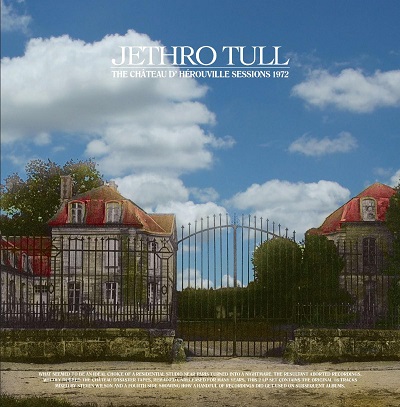Back in the day as much as now in the day, Ian Anderson had the propensity and capacity to write a lot of music. One stroll though the Tull catalog, including the retrospectives and box sets, and it’s easy to surmise there’s a wealth of material beyond the group’s formal catalog. Most notable is the aborted double album recorded at the Château d’Hérouville studio near Paris, France. Coming off the success of 1972’s Thick As A Brick, Tull ambitiously tackled the epic project at the famous studio where Pink Floyd and Elton John had recorded, only to become victim to equipment failures, bed bugs and food poisoning. No wonder the sessions earned the nickname “Château d’Isaster.” Determined to turn things around, the band decamped back to England, where they began a whole new album that would become 1973’s A Passion Play.
Over time, songs from the Château d’Herouville sessions have come to light and released in various forms — on the 1988 20 Years Of Jethro Tull box set, 1993’s Nightcap compilation, and the 2014 A Passion Play: An Extended Performance box set. All the pieces have been rounded up for a double vinyl set remixed by Steven Wilson called The Château d’Herouville Sessions. Tracking through the first three sides of the set, which is about as far as Tull got with the project before abandoning ship, it’s easy to get caught up in the growing pains Anderson and company were experiencing as they became more adventurous and progressive.
The Château d’Herouville Sessions begins with “The Big Top,” its arch adapted by A Passion Play before everything shifts into a more astute piece with Anderson strumming his acoustic and outlining the tale while the rest of the band find their suitable ports of entry. The material is certainly more streamline when compared to A Passion Play, which would explain why both “Skating Away On The Thin Ice Of The New Day” and “Only Solitare” were later refined for 1974’s more song-oriented WarChild. That, of course, leaves a lot of potent tape to linger in the vaults. It seems almost criminal that a song as powerful and alluring as “Sailor” was left for dead for over four decades.
“Critique Oblique (Part I)” and “Critique Oblique (Part II)” were folded into the more compact and feral “Critique Oblique” that appears on A Passion Play. Anderson and company weren’t about to let that riff and refrain fade into the background. Hearing the group vamp out on the tune in two parts is proof enough that even the bed bugs and bad food weren’t about to usurp the embedded chemistry of Jethro Tull in 1972. Keyboardist John Evan dominates “Animelle (1st Dance)” and “Animelle (2nd Dance)” with equal turns at piano and organ. Meanwhile, a quirky predilection for studying the co-existence of man and animal — more fully realized on A Passion Play and WarChild — surfaces in the two-part “Law Of The Bungle,” which features a short monologue from guitarist Martin Barre, as well as a short acoustic interlude called “Tiger Toon.”
The fourth side reigns “The Chateau D’isaster Tapes” and its three parts — “Scenario,” “Audition,” and “No Rehearsal” into an 11-minute highlight reel of the sessions. To fill out the rest, WarChild versions of “Only Solitaire” and “Skating Away On The Thin Ice Of The New Day” sandwich A Passion Play’s “The Story Of The Hare Who Lost His Spectacles,” a beloved departure that bassist Jeffrey Hammond-Hammond received a rare co-writing credit with Anderson, due to his colorful narration. Altogether, The Château d’Herouville Sessions stands up well on its own merit, even as certain sections were utilized elsewhere. Maybe that’s why it’s an essential part of the Jethro Tull puzzle any curious-minded fan should seek out and add to their collection.
~ Shawn Perry




















